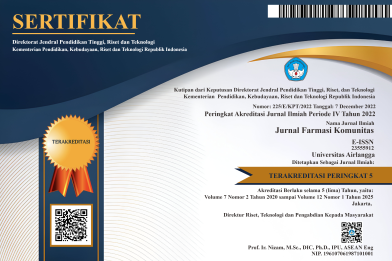Efektivitas Penggunaan Layanan Telefarmasi di Era Pandemi COVID-19 dari Perspektif Masyarakat
Downloads
Pandemi COVID-19 di Indonesia pertama kali diumumkan pada Maret 2020. Kasus COVID-19 yang terus meningkat mendorong pemerintah untuk menetapkan berbagai macam kebijakan untuk menekan angka positif COVID-19 seperti penerapan protokol kesehatan, physical distancing, dan Pemberlakuan Pembatasan Kegiatan Masyarakat (PPKM). Pandemi COVID-19 telah menimbulkan berbagai masalah kesehatan, salah satunya yaitu terhambatnya pelayanan kefarmasian. Oleh karena itu, penerapan telefarmasi di kalangan masyarakat dapat menjadi sebuah pelayanan alternatif demi mengurangi tendensi interaksi aktif secara langsung antara apoteker dengan pasien. Penelitian ini bertujuan untuk mengetahui efektivitas penggunaan layanan telefarmasi di era pandemi COVID-19 dari perspektif masyarakat. Penelitian ini merupakan penelitian Cross-Sectional dengan instrumen berupa kuesioner yang disebar secara online melalui google form. Pengambilan sampel dilakukan secara accidental sampling dengan kriteria inklusi masyarakat umum berusia 15-65 tahun yang berdomisili di Pulau Jawa. Berdasarkan hasil survei terhadap 243 responden, 90 responden (37,03%) pernah menggunakan telefarmasi dan dari 90 responden tersebut semuanya (100%) merasa terbantu dengan adanya pembelian obat secara online, 56 responden (62,2%) menyatakan pelaksanaan pemantauan terapi obat melalui telefarmasi berjalan dengan efektif, 58 responden (64,4%) menyatakan pelaksanaan pemantauan efek samping obat berjalan dengan efektif, dan 72 responden (80%) dapat memahami Informasi obat yang diberikan. Hal ini menunjukkan bahwa penggunaan telefarmasi di era pandemi COVID-19 efektif dari perspektif masyarakat. Namun, pemahaman dan minat masyarakat terkait telefarmasi masih kurang sehingga penggunaannya masih cukup rendah di masyarakat. Untuk itu perlu dilakukan promosi kesehatan terkait telefarmasi agar masyarakat lebih mengenal telefarmasi dan dapat memaksimalkan penggunaanya di era pandemi COVID-19.
Alhmoud, E., Khiyami, D. al, Barazi, R., Saad, M., Al-Omari, A., Awaisu, A., Enany, R. and Hail, M. (2022) ‘Perspectives of clinical pharmacists on the provision of pharmaceutical care through telepharmacy services during COVID-19 pandemic in Qatar: A focus group.', PLOS ONE, 17(10), pp. 1-19. doi: 10.1371/journal.pone.0275627.
Arrang, S. T. (2021) ‘Drug information service during covid-19 pandemic.', MITRA: Jurnal Pemberdayaan Masyarakat, 5(1), pp. 30–37. doi: 10.25170/mitra.v5i1.1467.
Baldoni, S., Amenta, F. and Ricci, G. (2019) ‘Telepharmacy services: present status and future perspectives: a review.' In Medicina, 55(7), pp. 327-339. doi: 10.3390/medicina55070327.
Clifton, G. D., Byer, H., Heaton, K., Haberman, D. J. and Gill, H. (2003) ‘Provision of pharmacy services to underserved populations via remote dispensing and two-way videoconferencing.', American Journal of Health-System Pharmacy, 60(24), pp. 2577–2582. doi: 10.1093/ajhp/60.24.2577.
Jindasook, C. (2020). Exploring Drivers and Barriers Toward Utilizing Telepharmacy among Pharmacy in Bangkok. Thesis Salaya: University of Madihol.
Jirjees, F., Odeh, M., Aloum, L., Kharaba, Z., Alzoubi, K. H. and Al-Obaidi, H. J. (2022) ‘The rise of telepharmacy services during the COVID-19 pandemic: A comprehensive assessment of services in the United Arab Emirates.', Pharmacy Practice, 20(2), pp. 2643-2654. doi: 10.18549/PharmPract.2022.2.2634.
Kemenkes RI (2016) Peraturan Menteri Kesehatan Republik Indonesia Nomor 73 Tahun 2016 tentang Standar Pelayanan Kefarmasian di Apotek, Pub. L. No. 73.
Kemenkes RI (2018) Peraturan Menteri Kesehatan Republik Indonesia Nomor 26 Tahun 2018 Tentang Pelayanan Perizinan Berusaha Terintegrasi Secara Elektronik Sektor Kesehatan.
Kemenkes RI. (2021). Infeksi Emerging Kementerian Kesehatan RI, viewed 20 October 2021. https://infeksiemerging.kemkes.go.id/.
Plantado, A. N. R., de Guzman, H. J. d. V., Mariano, J. E. C., Salvan, M. R. A. R., Benosa, C. A. C. and Robles, Y. R. (2021) ‘Development of an online telepharmacy service in the philippines and analysis of its usage during the covid-19 pandemic.', Journal of Pharmacy Pratice, 1(1), pp. 1–15. doi: 10.1177/08971900211033120.
Pratiwi, M. and Hanifah, S. (2022) ‘Pelayanan Telefarmasi Selama COVID-19.', Journal of Pharmacopolium, 5(2), pp. 211-217.
Stumpf, S. H., Zalunardo, R. R. and Chen, R. J. (2002) ‘Barriers to telemedicine implementation usually it's not technology issues that undermine a project--it's everything else.', Healthcare Informatics: The Business Magazine for Information and Communication Systems, 19(4), pp. 45–48.
Tjiptoatmadja, N. N. and Alfian, S. D. (2022) ‘Knowledge, perception, and willingness to use telepharmacy among the general population in Indonesia.', Frontiers in Public Health, 10(1), pp. 1-6. doi: 10.3389/fpubh.2022.825554.
Unni, E. J., Patel, K., Beazer, I. R. and Hung, M. (2021) ‘Telepharmacy during COVID-19: A Scoping Review.', Pharmacy, 9(4), pp. 183-195. doi: 10.3390/pharmacy9040183.
Wattanathum, K. (2021) ‘Types of activities and outcomes of telepharmacy: a review article.', Isan Journal of Pharmaceutical Sciences, 17(3), pp. 1-15. doi: 10.14456/ijps.2021.13.
Copyright (c) 2022 Jurnal Farmasi Komunitas

This work is licensed under a Creative Commons Attribution-NonCommercial-ShareAlike 4.0 International License.
In order to be accepted and published by JFK, author(s) submitting the article manuscript should complete all the review stages. By submitting the manuscript, the author(s) agreed to these following terms:
1. Copyright of the article is transferred to the journal (JFK), by the knowledge of the author, whilst the moral right of the publication belongs to the author. The intended copyright includes the rights to publish articles in various forms (including reprints). JFK maintain the publishing rights to the published articles.
2. The formal legal aspect of journal publication accessibility refers to the Creative Commons Attribution-Non-Commercial-Share Alike (CC BY-NC-SA), which implies that the publication can be used for non-commercial purposes in its original form.
3. Every publication (print/electronic) is open access for educational, research, and library purposes. In addition to the objectives mentioned above, the editorial board is not responsible for copyright infringement
The Copyright Transfer Agreement Form can be downloaded ON THIS FORM.

Jurnal Farmasi Komunitas (JFK) by Unair is licensed under a Creative Commons Attribution-NonCommercial-ShareAlike 4.0 International License.








